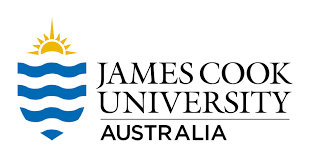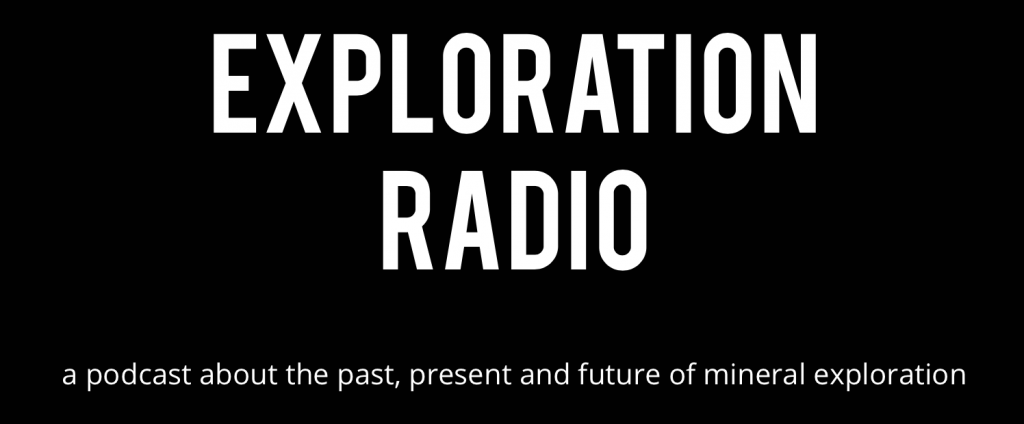
Two new podcast episodes are now available!
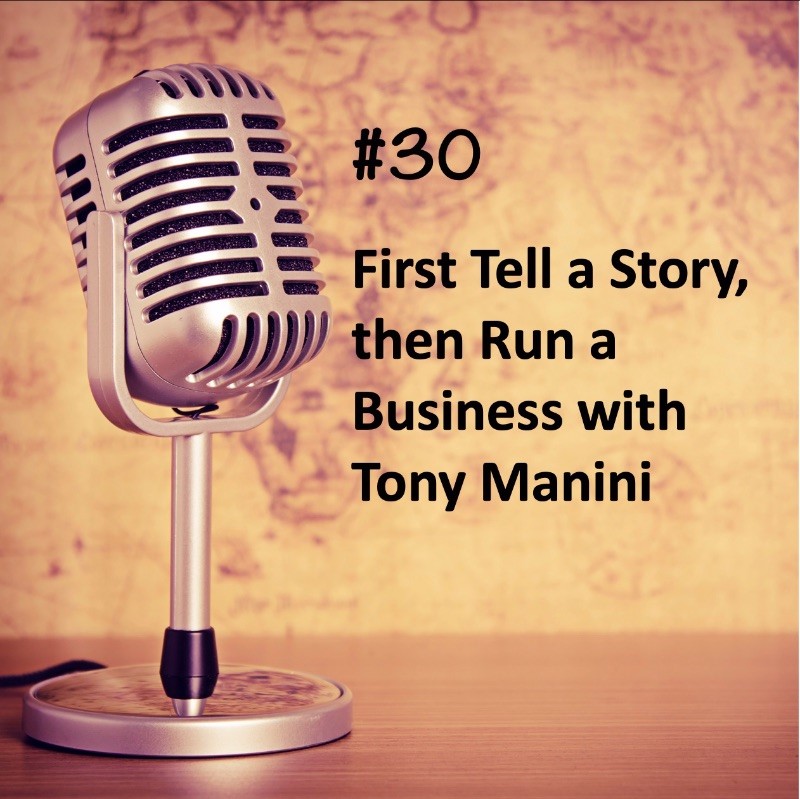
One of the main non-technical challenges in mineral exploration is getting investment. Overwhelmingly, companies seem to favour becoming a publicly listed company on a stock exchange to raise funds. The challenge there is how to effectively engage a largely uninformed investor base and retain them over the long term. Maybe we would be better off with a private funding model for early stage exploration – similar to venture capital firms funding startups. Irrespective of how we get funding, we need to remember to run exploration like a business.
Tony Manini is the Co-Founder and Executive Director of a private equity firm called EMR Capital.
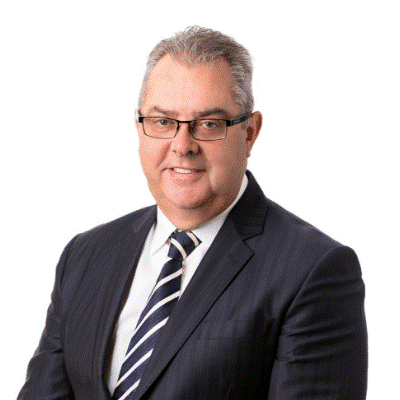
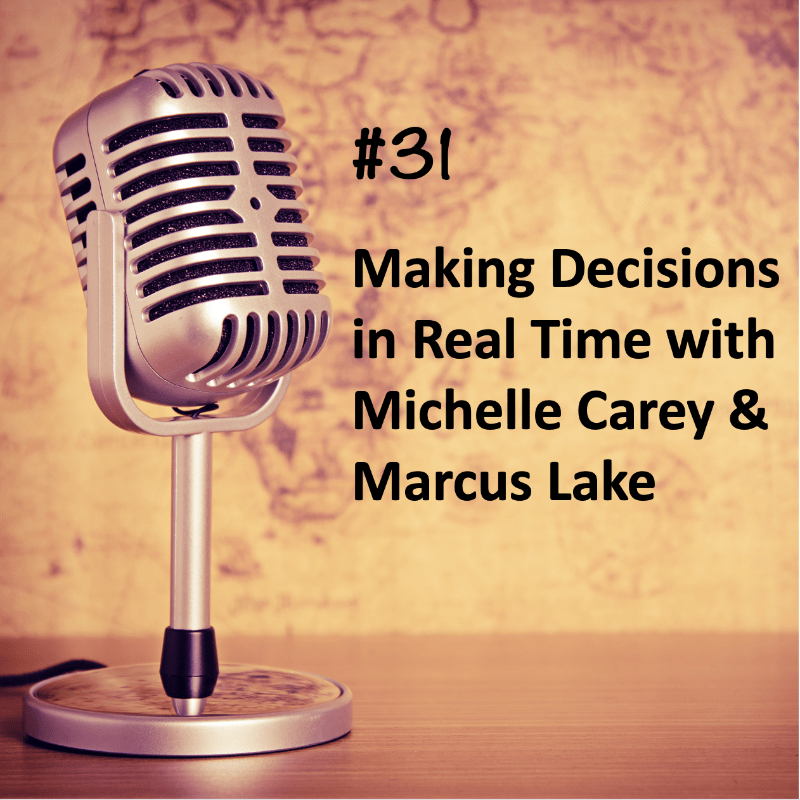
We often suffer from a time lag between acquiring data and using it to make a decision. If only we could get the data quicker, we would be so much better at what we do. Maybe this explains our obsession in developing technology that provides us data in real time. But we are forgetting something. It is not about getting the data quicker, it is about being able to make better decisions faster. Like the petroleum industry, we want real time “answer products” – not just real time data.
In this episode, we are joined by Michelle Carey from IMDEX and Marcus Lake from Olympus, two companies that are at the forefront of developing technology to assist with real time decision making.
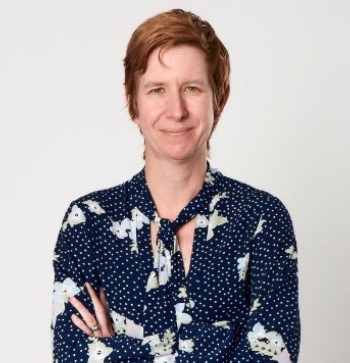
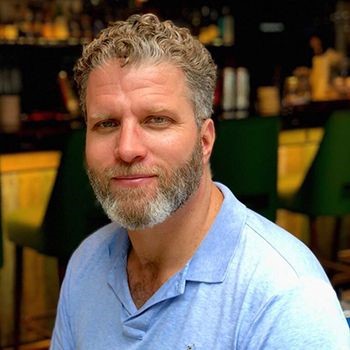
AIG is a proud sponsor of Exploration Radio. Access the podcasts using your favourite podcasting application or via the Exploration Radio website.
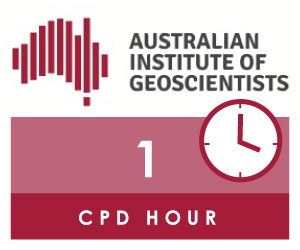
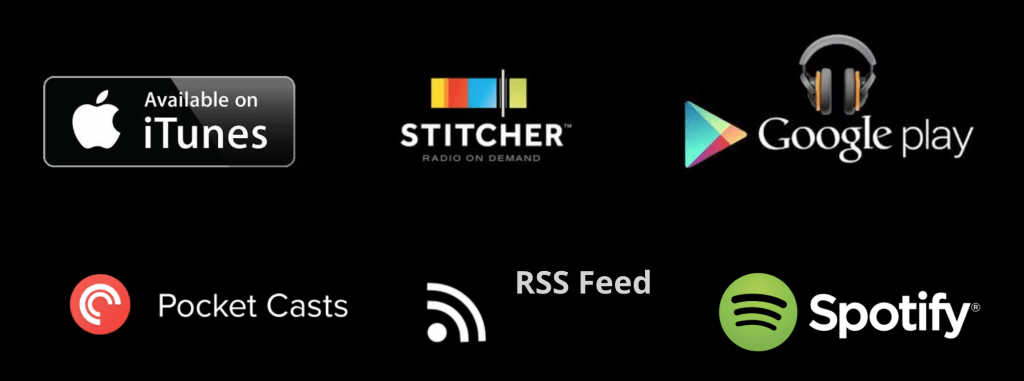
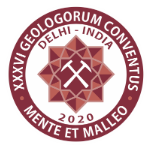
The International Geological Congress is a mega event organised every four years. The next edition – the 36th – will be organised in Delhi, India, March 2-8, 2020.
The Congress has 45 themes, covering practically all aspects of Planet Earth, has > 60 field trips, a GeoExpo, and a variety of other programs.
Each theme has several symposia; under each symposium, again, there will be many sessions. You are welcome to submit your abstract at the Congress website (www.36igc.org) and make your presentation at the IGC. You could also go on a field trip, or participate in/organise a workshop or short course and/or enjoy looking around the country, its culture and culinary specialties, its art and architecture, its history and heritage. India provides a world of opportunities!
Thanks to the munificence of the Government of India, we are able to offer a Geohost Support Program that is unprecedented in the history of IGC! We will be providing 1000 free registrations, 1000 airfares and 1000 local hospitality packages to geoscientists/ geoscience students. These will be provided either as full or partial support. So, hurry up and apply online for a Geohost grant! Please visit our website www.36igc.org for all the details.
Revised deadline for abstract submission: October 31, 2019.
Revised deadline for Early Bird registration: November 30, 2019
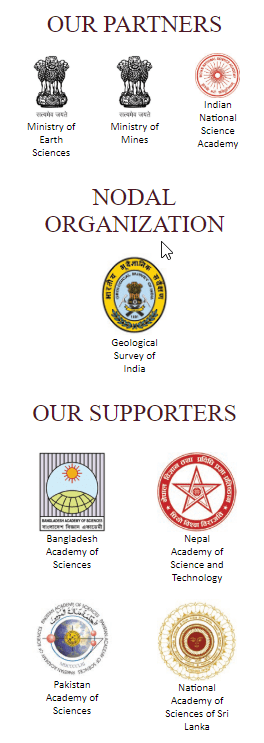
Dates and venues: 11-13 February 2020, Chatswood Club, 11 Help St, Chatswood (Sydney) – 5 minutes walk from Chatswood station and the W.B. Clarke Geoscience Centre, Londonderry.

11-12 February: Two days of PowerPoint lectures focus upon mineral exploration for epithermal and porphyry ore deposits derived from Dr Corbett’s 40 years field experience, including short courses provided with the late Terry Leach from the early 1990’s. Exploration and mining examples from over 40 countries are used to delineate the characteristics of different epithermal and porphyry ore types, and controls to mineralisation, using tools such as alteration, structure and breccias. A final section considers geological features recognised in exploration marginal to ore bodies. Participants will be provided with exercises to test yourselves and a current draft of the new short course notes. Early drafts of the first few chapters are available at: http://corbettgeology.com/Publications/.

13 February: A practical exercise held at the W B Clarke Geoscience Centre, Londonderry, uses diamond drill core and geological specimens referred to in the lectures (above), to provide hands on training in ore and alteration mineralogy and the use of geological models. Greg is helped by and Stuart Hayward, who has over 30 years experience in epithermal-porphyry ore deposit exploration and mining. Return bus from Chatswood and lunch provided.
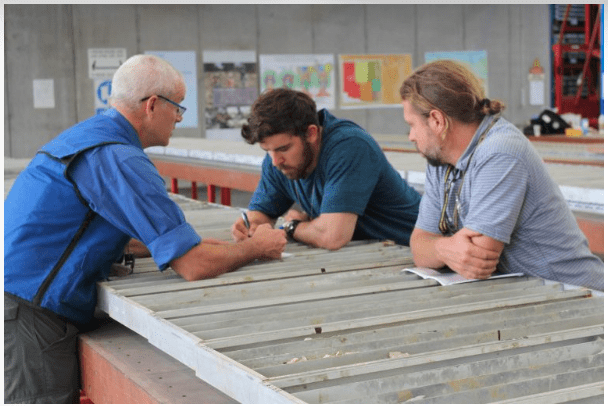
Registration fees include handouts, lunch, morning and afternoon teas and transport to and from Londonderry.
Minimum of 20 participants required and limited to a maximum of 40.
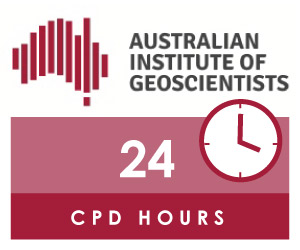
Employed geologists from $1500 + GST
Unemployed geologists from $400 + GST
Students $150 + GST but if you need assistance contact greg@corbettgeology.com
Registration www.corbettgeology.com/services/
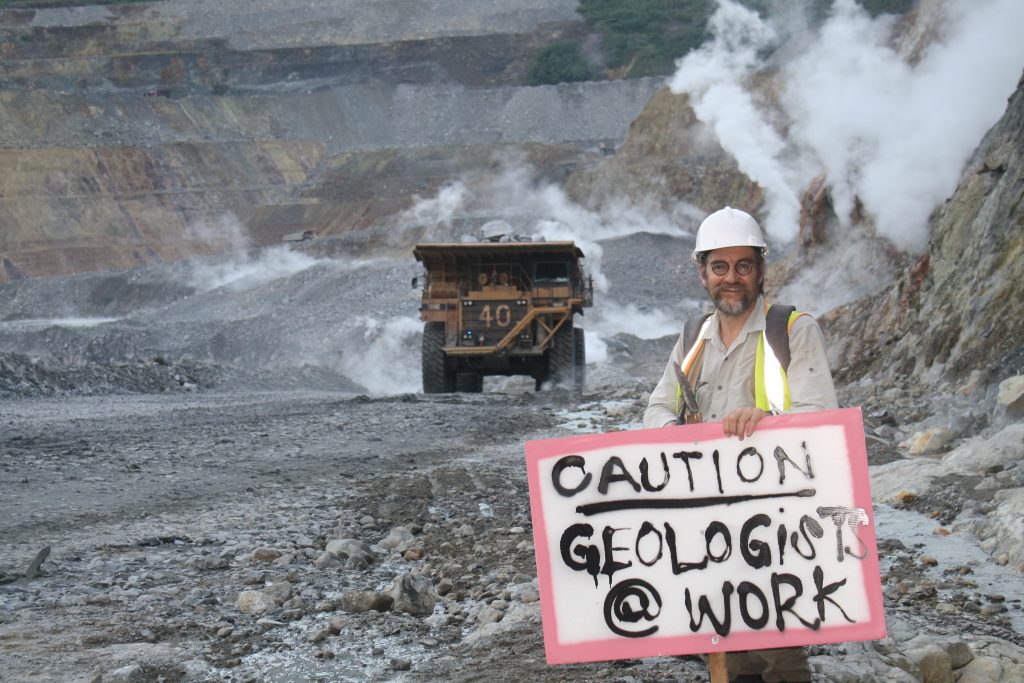
The Australian Geoscience Council (AGC) is pursuing a Vision to raise the profile of Geoscience to be pre-eminent in Australia and to be recognised as one of the great fields of general science with Physics, Chemistry and Biology. In doing this the AGC is calling for nominations for the next National Geoscience Champion. This honour will be awarded to very few geoscientists. It will recognise major contributions to our science, craft and art, evidenced by technical, leadership, mentoring and collegial endeavours.
Nominations for National Geoscience Champions should include:
Nominations should be concise and not exceed more than 500 words or an A4 page.
A panel of at least three AGC members will be involved in the assessment of National Geoscience Champion awards as required. The Panel shall be include the President of the AGC with the Opportunity to co-opt specific panel members to assist and advise as required.
An award of National Geoscience Champion is not made as an annual event rather there will be up to a maximum of EIGHT National Geoscience Champions at any given time – reflecting the number of membership organisations involved in the AGC.
Awardees of the National Geoscience Champions do not have to be current members of any of the AGC Member Organisations. The award will be given on merit and not on membership.
National Geoscience Champions will be asked to participate in events during the years following the award to engage and enthuse geoscientists and to promote geoscience nationally. Where necessary the AGC will provide financial assistance to the National Geoscience Champion to attend these events.
Nominations should be submitted by email to admin@agc.org.au. Further details the nomination process are available from the AGC website.

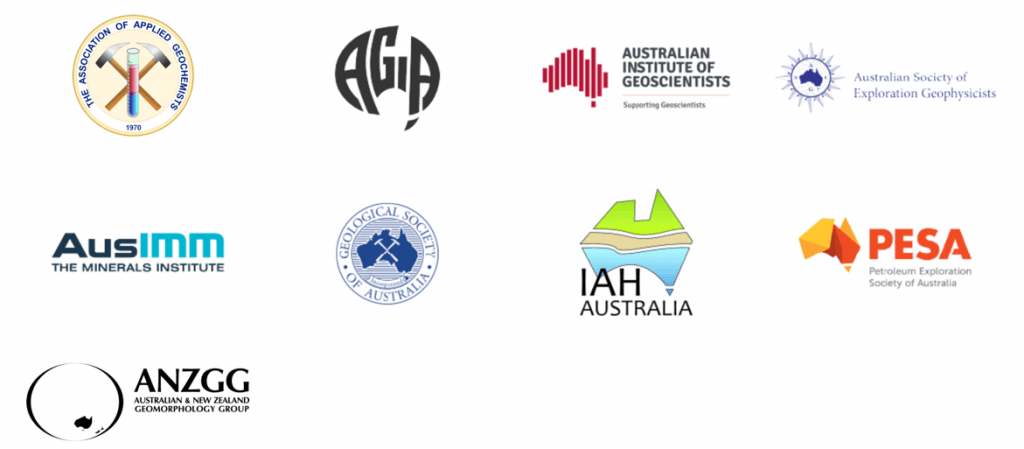
The South Australian government has initiated Growth State – Our Plan for Prosperity recognising we need to do things differently to create an environment that is conducive to economic growth and a more sustainable, prosperous future for South Australians.
Carefully designed to leverage South Australia’s competitive advantages, Growth State is a work plan to promote industry growth by responding to the needs of business and industries.
At its heart, Growth State articulates what government is doing, informed by what industry needs.
Growth State is a coordinated government commitment to real, concrete actions and deliverables.
Removing barriers, clearing paths, facilitating, and aggregating, Growth State will be instrumental in focusing government resources and energies. Working in consultation with industry, together we will reaffirm the positive aspects of living and working in South Australia to enhance the prospect of investing here.
The energy and mining sector is one sector where substantial prospects exist to responsibly develop opportunities, grow productivity and grow our competitiveness.
The Consultation Paper outlines current Energy and Mining programs and potential further action to support Growth State in this critical sector of the economy.
Existing industry initiatives such as the Copper Strategy, Magnetite Strategy,
South Australian Hydrogen Action Plan and the Roundtable for Oil and Gas will be complemented by the Clean Energy Transition and new initiatives such as the Accelerated Discovery Initiative, Battery and Emerging Minerals Strategy and the Electric Vehicle Strategy foreshadowed in the 2019-2020 State Budget.
This Consultation Paper defines the scope of the energy and mining sector and suggests ambitious targets to support the objectives of Growth State. It also seeks feedback to define what business needs so further actions can be identified that will encourage confidence and address barriers to investment.
The final version of the Strategy will inform government of the energy and mining sector’s priority needs in delivering stronger growth and will highlight relevant government commitments.
Government will respond to sector strategies through the Growth State work plan.
We need energy and mining businesses and industry input for this Energy and Mining Strategy and your feedback on the information provided in this Consultation Paper.
You can provide feedback through the Department for Energy and Mining website or email DEM.customerservices@sa.gov.au by 1 November 2019.
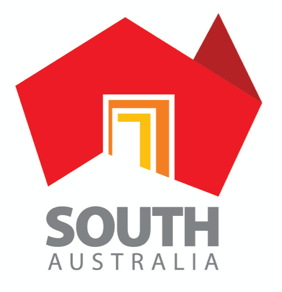

AN INITIATIVE OF THE AUSTRALIAN GEOSCIENCE COUNCIL AND THE AUSTRALIAN ACADEMY OF SCIENCE
Specific funding is available to provide Australian and New Zealand geoscientists in the early stages of their careers with opportunities to travel internationally to further their careers as geoscientists by, for example, undertaking field work in appropriate areas, visiting and working with appropriate international experts, inspecting appropriate mines or other geoscientific features such as type localities, contributing to professionally-organised geoscientific conferences or conventions, etc. Read about previously-awarded Travel Grants.
The 2019 call for applications is now open and will close on 16 December 2019.
Click here for more information and to apply for a grant.


The Women in Resources Awards are designed to recognise individuals and organisations working to build a world-class industry, which provides attractive career opportunities and enhances the recognition and participation of women in the sector.
This year we have six award categories:
Nominations for the awards will close on Monday 11 November 2019, 5pm (WST).
The awards nomination portal, guidelines for submitting nominations and profiles of previous winners are available on the CME website.
CME will be holding a nomination workshop to assist companies and individuals to plan and prepare nominations for the awards.
The workshop will be held at CME on Wednesday 16 October 2019 from 12noon to 1pm (WST), for those who wish to attend.
CME is pleased to have Sarah Mitchell as a guest facilitator to present on how to write an award-winning nomination.
A light lunch will be provided. Please email a.lemoine@cmewa.com to register for the workshop in person or via Skype.
CME would like to invite sponsorship for the 2020 Women in Resources Awards. Sponsorship of the awards will enable CME to continue to advocate the value of a gender diverse workforce in the WA resources sector.
More information about sponsorship opportunities can be found on the CME website.
For further information, please contact Amanda Le Moine of CME at a.lemoine@cmewa.com
The Commonwealth Department of Employment, Skills, Small and Family Business (DESSFB) have released their review of geologist and geophysicist employment in Australia for 2019.
The department’s survey revealed recruitment difficulty for geophysicists and underground mine geologists, in a generally tightening employment market.


The DESSFB survey concluded:

The release of the DESSFB survey findings coincides with the latest quarterly AIG Australian geoscientist employment survey being open for contributions. The declining trend in geoscientist unemployment evident in the AIG survey results is considered consistent with the tightening of the skills market identified by DESSFB. Long-term unemployment remains a feature of the AIG surveys. This could be consistent with the high number of applicants per job identified by DESSFB.
The DESSFB, importantly, notes that exploration and mining are the dominant source of geoscientist employment opportunities in Australia.
What do these results mean for you? Have your say by leaving a comment here or via the AIG Linkedin group. You can also contribute to the latest AIG geoscientist employment survey by following this link before 26 October 2019.
The latest instalment in AIG’s Australian Geoscientist Employment survey series will provide data on trends in geoscientist employment in Australia during the third quarter (July to September) of 2019.
Unemployment amongst Australian geoscientists rose during the second quarter of 2019 but continued a downward trend that has been evident in survey results since March, 2016. At 30 June, 2019, the latest AIG Australian Geoscientist Employment Survey revealed an unemployment rate of 9.3% nationally, up from 7.5% recorded three months earlier at the end of March 2019.
The underemployment rate amongst self-employed geoscientists, however, improved, falling from 20.5% at the end of March to 14.9% at the end of June.
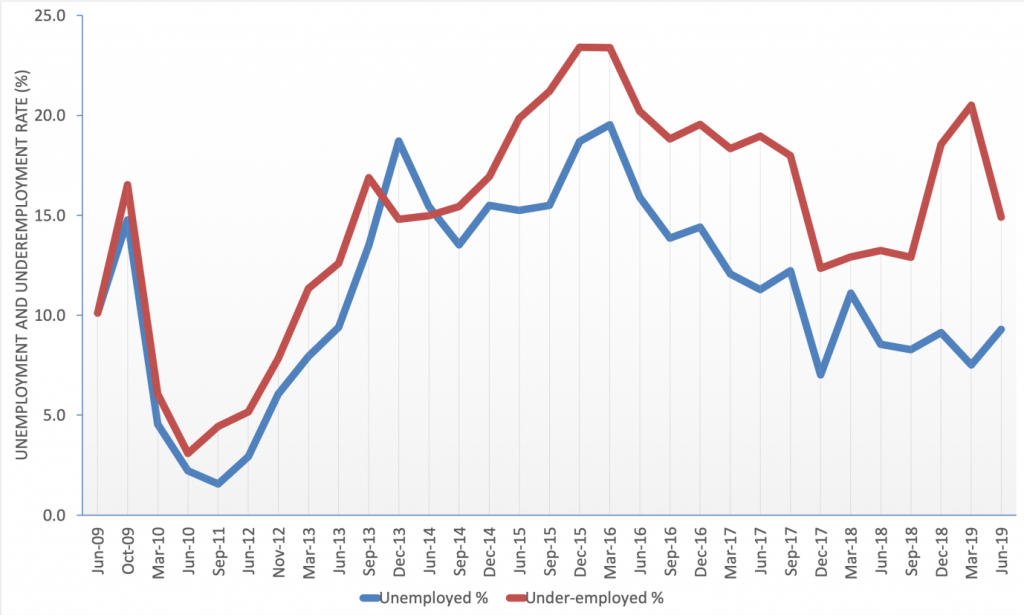
A high rate of long term unemployment and under-employment continued to be a concern, with more than half of the unemployed respondents reporting being out of work or unable to achieve their desired level of work for more than 12 months.
The survey takes only two or three minutes to complete. You do not need to be an AIG member to contribute. No data that could personally identify respondents is collected. Contributions to the survey are required from both employed and unemployed geoscientists to ensure the relevance of results. Your completing the survey really helps to make a difference to the standing and knowledge of our profession.
The survey will be open for contributions until 26th October 2019. Every contribution adds to the reliability of the survey results.
Sincere thanks in advance for your continued support.
8th Biennial ACROFI Conference
16-28 June, 2019, Townsville, Qld Australia
Submission Opens: 11 November 2019
Submission Closes: 28 February 2020
Notification: by 18 March 2020
Opens: Wednesday 22 January 2020
The Economic Geology Research Unit (EGRU) at James Cook University will host the 8th international ACROFI conference and invites academics, researchers, students and industry professionals to join us in Townsville, Queensland, from 15-18 June 2020.
The main theme of the conference is the study of fluid-and-melt inclusions. The meeting typically has an informal character and is ideally suited for students to present their results and meet experts in their fields. The meeting will include three days of presentations (oral and poster) preceded by a two day workshop (basic concepts of fluid inclusion studies, LA-ICP-MS analyses of fluid inclusions, lab visit) and followed by a one-day post-conference field trip.
Conference topics will include:
Keynote Speakers:
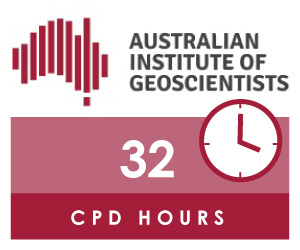
Conference Schedule
Sunday 14 – Monday 15 June: Workshop
Monday 15 June (evening): Welcome Function
Tuesday 16 – Thursday 18 June: Technical Talks
Friday 19 June: Field Trip
For further information please contact the Conference Conveners: Jan Huizenga / Carl Spandler / Yanbo Cheng / Kaylene Camuti
Or contact the EGRU Administration Officer: Judy Botting
Visit the conference web page or download the conference circular.
